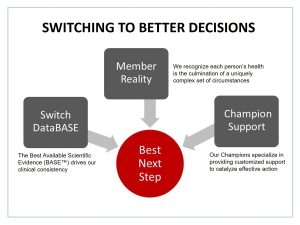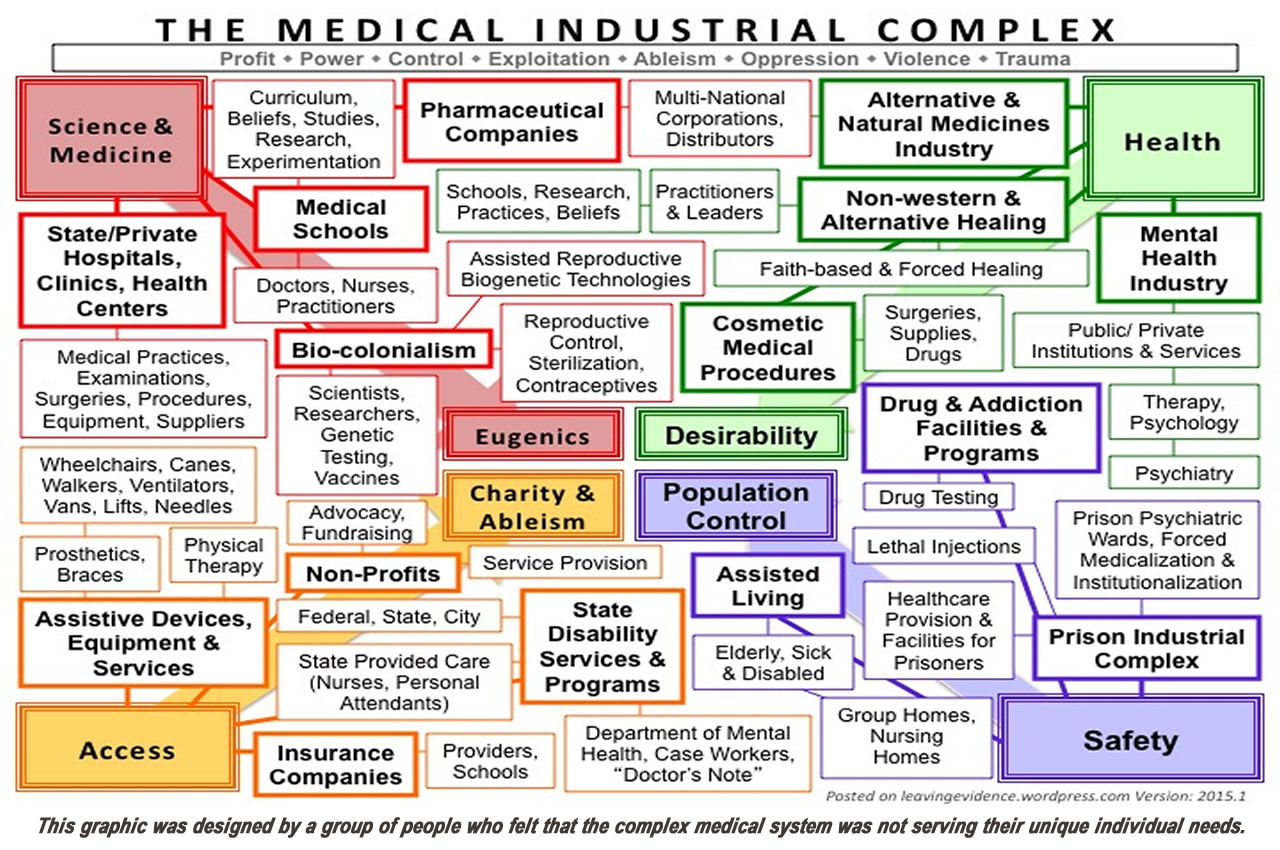This Conversation explores the question,
“Why don’t U.S. employers make better decisions about their healthcare benefits?”
The short answer – to date employers haven’t had any really good options. How can we be sure? Our healthcare costs are double that of other developed countries, and our health status ranks in the bottom 20%. Twice the costs plus poor results equals a thoroughly broken system.
The graphic above outlines the entangled Medical Industrial Complex from a health advocate’s perspective. The complexity alone suggests that more than just tinkering with the status quo is necessary to achieve meaningful change.
Should employers continue to hone their benefit plan design, find the best provider networks, and update wellness programs? Yes, such initiatives can keep cost escalations lower than they otherwise would be.
However, such incremental improvements won’t be enough to give a company parity with international competitors with more effective healthcare systems.
There are three underlying reasons why the healthcare status quo ensures continued poor value:
- Suboptimal decisions are greased with higher profits,
- Enhanced technology only amplifies the flaws of an ineffective system (a variation of garbage in / garbage out), and
- Commercially generated “science” is increasing the gap between “best practice” and “actual practice”.
Steve Brill describes the fallout from the third bullet above in his well-researched documentary on the drug Risperdal®. The FDA had approved a niche market for the drug that was worth about $50 million. When Risperdal’s annual sales reached thirty times that amount, the FDA initiated a lawsuit for unauthorized marketing.1
From the company’s perspective, the drug was a smashing success. The billion-dollar FDA fine levied against them was described in the financial press as “just the cost of doing business” and investors agreed. After the verdict the stock price went up despite the evidence that the company had repeatedly misrepresented the scientific data to the medical community. The harm to patients was significant, but it seems that in maximizing shareholder value as in war, collateral damage may be unavoidable.
Such business practices are all too frequent2 No employer should have to pay for such distortion. No patient should have his health jeopardized because scientific data has been selectively withheld to boost pharmaceutical sales. Are employers protected against such practices? No.
Our Key Tactic Is Trust
Switch sidesteps the momentum of the status quo by aligning the interests of employers and employees with our pragmatic expertise:
- Employers want to decrease their company’s healthcare costs and have healthy, productive and appreciative employees.
- Employees want healthy lives and less expensive healthcare.
- Success in both #1 and #2 requires better health-related decisions.
“So, how does Switch catalyze better decisions?” We work smarter.
The work of Harvard psychologists Daniel Kahneman3 and Dan Ariely4 convincingly demonstrates that both unconscious conditioning and environmental cues are dominant factors in determining how decisions are made. Such factors underlie why, despite desperately wanting to be healthy, Americans still choose to eat 700 donuts a year but only 33 apples. These factors also explain why the prescriptions that busy clinicians write can be more influenced by pharmaceutical marketing than what’s best for their patients.
The following slide outlines our relentless focus on improving decisions. We believe in the power of strategic clarity. Let us put it to work for you.
We believe in the power of strategic clarity. Let us put it to work for you.
Breakthrough To Better,
Carl
1Beloved American pharmaceutical corporation gets results using questionable tactics
2Wikipedia List of Largest Pharmaceutical Settlements
3Thinking Fast and Slow, by Daniel Kahneman
4Predictably Irrational, by Dan Ariely
____________________________________________________________________________________
Switch Conversations is a bi-weekly blog exclusively for our potential employer partners.
____________________________________________________________________________________
ALL POSTS:
Edition 1 – Solving a Well-Entrenched Problem
Edition 2 – A Case of Dr. Jekyll and Mr. Hyde
Edition 3 – Best marketing tagline of all time?
Edition 4 – Post-Truth Killed a President
Edition 5 – What’s an employer to do?
Edition 6 – Profiting From the Opioid Epidemic
Edition 7 – The Keys to Unlocking Better Decisions
Edition 8 – When Difficult Things Need to be Done Well
Edition 9 – Fixing Healthcare
Edition 10 – Beware of a Singing Cow
Edition 11 – Wise Reflections
Edition 12 – Warning: Reader Discretion Advised
Edition 13 – Can AI save healthcare? (Part 1)
Edition 14 – Can AI save healthcare? (Part 2)
Edition 15 – Can AI save healthcare? (Part 3)
Edition 16 – Embracing Reality to Improve Healthcare
Edition 17 – Everything I Needed To Know…
Edition 18 – The Eighth Circle of Hell
Edition 19 – So… What’s Our Solution?
Edition 20 – Protecting Integrity as a Core Strategy
Edition 21 – An Unadorned Legacy
Edition 22 – Time to Grow Up
Edition 23 – Against All Odds
Edition 24 – When Everyone Has Stopped Listening
Edition 25 – Focusing on What’s Important
Edition 26 – Don’t Give Up Your Shot
Edition 27 – Join the Goodhood
Edition 28 – Fixing Healthcare (Recycled)
Edition 29 – Taming the Healthcare Beast
Edition 30 – Leadership
Edition 31 – Better Health Requires Good Sense
Edition 32 – Little Decisions With Big Consequences
Edition 33 – Transformational Courage
Edition 34 – Transformational Courage – Part 2
Guest Post – Happy Thanksgiving! By Jeff Novick, RD
Edition 35 – Transformational Courage – Part 3


